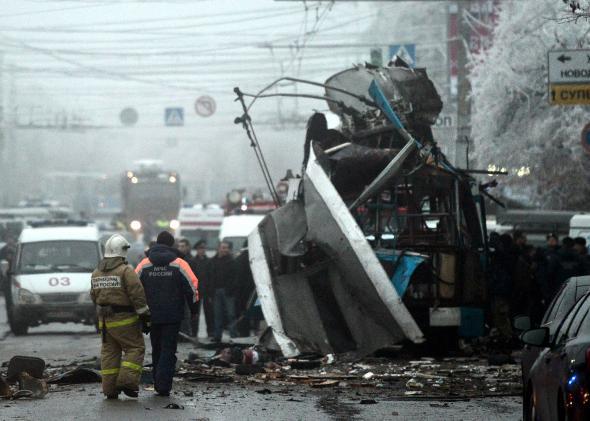The rash of deadly bombings that have struck Russia in recent days have understandably provoked safety fears ahead of the upcoming Sochi Olympics, but outsiders might also be wondering why so many of those committing the country’s worst acts of terrorism are women.
Female suicide bombers are hardly an unknown phenomenon in conflicts ranging from Israel-Palestine to Sri Lanka, but the role of the “Black Widows” as they’ve been dubbed in the press, seems particularly prominent and high-profile in the long-running insurgency in the North Caucasus.
A female bomber is believed to have carried out yesterday’s bombing at the Volgograd railway station as well as a bus bombing that killed five people in the same city in October. Female bombers are also believed to have carried out the attack on the Moscow Metro that left 38 dead in 2010 and took part is Russia’s two worst modern terrorist attacks: the 2002 Nord-Ost theater siege and the 2004 Beslan school attack.
The first Black Widow attack was in 2000, when Khava Baraeva “drove a truck filled with explosives into a building housing Russian special forces in Chechnya.” In August, journalist Anna Nemtsova wrote in the Daily Beast that “In the last 12 years, 46 women have turned themselves into suicide bombs in Russia, committing 26 terrorist attacks (some attacks involved multiple women). Most of the bombers were from Chechnya and Dagestan.”
Most studies of Chechen female suicide bombers have found that they tend to be women who have experienced serious personal trauma and are then exposed to recruitment from jihadist military groups. As the term “Black Widow” would suggest, many have lost close family members over the last two decades of violence since war first broke out in Chechny.
A 2006 survey by the psychologists Anne Speckhard and Khapta Akhmedova published by the Jaffee Center for Strategic Studies atTel Aviv University found that “all individuals within the sample had experienced deep personal traumatization, and evidence of symptoms of post-traumatic stress disorder and dissociative phenomena as a result of direct personal traumatization were present in the entire sample…. The path to terrorism nearly always begins with individuals who due to their traumatized psychological state are attracted to radical groups and seek out the jihadist ideology as they grapple with their rather extreme and violent losses.” The authors wrote that none of the women “appear coerced, drugged, or otherwise enticed into these acts.”
Nemtsova expands on some of the factors that may drive these women to terrorism:
In the Caucasus, the topics of love and sexual frustration are taboo subjects, too shameful to discuss even with close girlfriends. Women are supposed to faithfully bottle up their desires inside and keep their frustrations secret. One human-rights activist, Kheda Saratova, has been interviewing women in an attempt to explore the inner traumas that could push a Muslim woman to join the radical militant movement. “They only speak about routine problems at home, but never issues in relationships or their sexual life—they fear public humiliation,” she says. For women whose husbands are in jail, missing or dead, and who are ostracized by their society, no culturally sanctioned outlet exists to air their grief.
Unfortuantely, as Nemtsova notes, the prominent coverage given to the Black Widows has led to further ostracism and even official abuse of the wives of killed militants, further contributing to these factors.
However, as Yulia Yuzik recently noted in Foreign Policy, Naida Asiyalova, the woman who carried out the October bombing, didn’t appear to fit the normal pattern. “She had lived and studied for years in Moscow, held down good jobs, and made ends meet in the Russian capital,” Yuzik writes, and appeared to take to suicide bombing less out of revenge for a specific trauma inflicted by the government than because it was the most effective way to carry out a terrorist attack. (Her husband and apparent collaborator in the attack, Dmitry Sokolov, was killed in a shootout with police in Dagestan in November.)
We don’t yet know much about the motivations of those who carried out this week’s attacks, but it’s clear that there are factors behind the brutal terrorism in this region that aren’t going to be eliminated by a pre-Olympic security crackdown.
